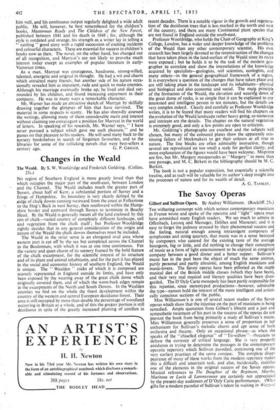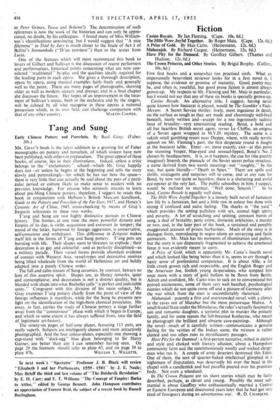The Savoy . Operas Gilbert and Sullivan Opera. By Audrey Williamson.
(Rockliff. 25s.) THE withering contempt with which serious contemporary musicians in France wrote and spoke of the operetta and "light" opera must have astonished many English readers. We see much to admire in Offenbach, Lecocq and Messager, Delibes and Massenet; and it is easy to forget the jealousy aroused by their phenomenal success and the feeling, natural enough among intransigent composers of symphonies and string quartets, that music was in a sense betrayed by composers who catered for the existing taste of the average bourgeois, big or little, and did nothing to change their conception of music as a form of light entertainment to be enjoyed in congenial company between a 'good dinner and a better supper. Sullivan's music has in the past been the object of much the same animus, partly personal and partly altruistic, among English musicians and music-lovers. The Savoy operas have been pilloried as the staple musical diet of the British middle classes (which they have been), and their very real musical and literary qualities have been disre- garded. The D'Oyly Carte monopoly has been partly responsible for this injustice, since stereotyped productions—however, admirable the type—cannot hold the interest of the more intelligent and artisti- cally conscious sections of the public. Miss Williamson's is one of several recent studies of the Savoy operas which show that the injustice on the part of musicians is being remedied. Ample quotation from Gilbert's libretti and a just and sympathetic treatment of his part in the success of the operas do not prevent the book from being primarily a study of Sullivan's music. Miss Williamson generally preserves a sense of proportion in her enthusiasm for Sullivan's melodic charm and apt sense of both orchestra and theatre. Only an occasional phrase—as when she speaks of the "chiselled elegance" of "Tit-willow"—threatens to debase the currency of critical language. She is very properly assiduous in trying to determine the passages in the contemporary operatic repertory which Sullivan parodied, continuing one of the very earliest practices of the opera comique. The complete disap- pearance of many of these works from the modern repertory makes this a difficult and uncertain task, and also, incidentally, stultifies one of the elements in the original success of the Savoy operas. Musical references to The Daughter of the Regiment, Martha, Maritana or Lucia di Lammermoor are certainly not appreciated by the present-day audiences of D 'Oyly Carte performances. (What gifts for a modern parodist of Sullivan's talent lie waiting in Wozzeck or Peter Grimes, Tosca and Boheme!) The determination of such references is now the work of the historian and can only be appre- ciated, no doubt, by his colleagues. I found many of Miss William- son's identifications convincing, but I would suggest that "A nice dilemma" in Trial by Jury is much closer to the finale of Act 1 of Bellini's Sonnambula ("13 'un pensiero") than to the sextet from Lucia.
One of the features which will most recommend this book to lovers of Gilbert and Sullivan is the discussion of recent performers and performances, historical points concerning what are now con- sidered "traditional" by-play and the qualities ideally required for the leading parts in each opera. She gives a thorough description, opera by opera, using musical examples fairly freely and generally well to the point. There are many pages of photographs, showing older as well as modern scenery and dresses; and in a final chapter she discusses the future. Her hopes of an improvement in the treat- ment of Sullivan's music, both in the orchestra and by the singers, will be echoed by all who recognise in these operas a national possession which, in its own field, can challenge comparison with



































 Previous page
Previous page